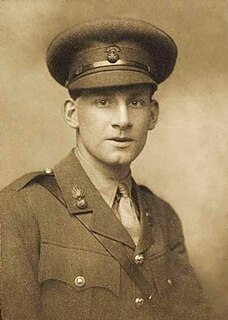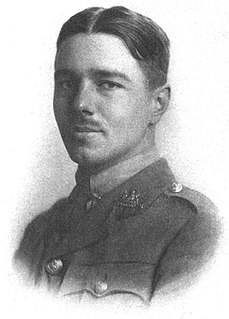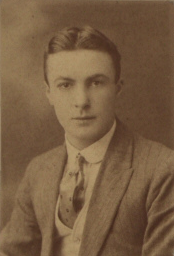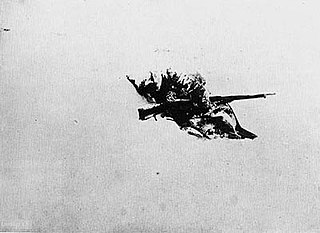Related Research Articles

Siegfried Loraine Sassoon, was an English poet, writer, and soldier. Decorated for bravery on the Western Front, he became one of the leading poets of the First World War. His poetry both described the horrors of the trenches and satirised the patriotic pretensions of those who, in Sassoon's view, were responsible for a jingoism-fuelled war. Sassoon became a focal point for dissent within the armed forces when he made a lone protest against the continuation of the war in his "Soldier's Declaration" of 1917, culminating in his admission to a military psychiatric hospital; this resulted in his forming a friendship with Wilfred Owen, who was greatly influenced by him. Sassoon later won acclaim for his prose work, notably his three-volume fictionalised autobiography, collectively known as the "Sherston trilogy".

Wilfred Edward Salter Owen, MC was an English poet and soldier. He was one of the leading poets of the First World War. His war poetry on the horrors of trenches and gas warfare was much influenced by his mentor Siegfried Sassoon and stood in contrast to the public perception of war at the time and to the confidently patriotic verse written by earlier war poets such as Rupert Brooke. Among his best-known works – most of which were published posthumously – are "Dulce et Decorum est", "Insensibility", "Anthem for Doomed Youth", "Futility", "Spring Offensive" and "Strange Meeting".

Cyril Edwin Mitchinson Joad was an English philosopher and broadcasting personality. He appeared on The Brains Trust, a BBC Radio wartime discussion programme. He popularised philosophy and became a celebrity, before his downfall in a scandal over an unpaid train fare in 1948.

Edward Owen Rutter was an English historian, novelist and travel writer.
Harry Collinson Owen (1882–1956) was a British journalist and author.

The Balkans theatre, or Balkan campaign, of World War I was fought between the Central Powers and the Allies.
The British XVI Corps was a British infantry corps during World War I. During World War II the identity was recreated for deceptive purposes.

The Macedonian front, also known as the Salonica front, was a military theatre of World War I formed as a result of an attempt by the Allied Powers to aid Serbia, in the fall of 1915, against the combined attack of Germany, Austria-Hungary and Bulgaria. The expedition came too late and in insufficient force to prevent the fall of Serbia, and was complicated by the internal political crisis in Greece. Eventually, a stable front was established, running from the Albanian Adriatic coast to the Struma River, pitting a multinational Allied force against the Bulgarian Army, which was at various times bolstered with smaller units from the other Central Powers. The Macedonian front remained quite stable, despite local actions, until the great Allied offensive in September 1918, which resulted in the capitulation of Bulgaria and the liberation of Serbia.

The Battle of Dobro Pole, also known as the Breakthrough at Dobro Pole, was a World War I battle fought between 15 and 18 September 1918. The battle was fought in the initial stage of the Vardar Offensive, in the Balkans Theatre. On September 15, a combined force of Serbian, French and Greek troops attacked the Bulgarian-held trenches in Dobro Pole, at the time part of the Kingdom of Serbia. The offensive and the preceding artillery preparation had devastating effects on Bulgarian morale, eventually leading to mass desertions.

The history of the city of Thessaloniki is a long one, dating back to the ancient Greeks (Macedonians). Today with the opening of borders in Southeastern Europe it is currently experiencing a strong revival, serving as the prime port for the northern Greek regions of Macedonia and Thrace, as well as for the whole of Southeastern Europe.

The history of the Jews of Thessaloniki (Greece) reaches back two thousand years.

XII Corps was an army corps of the British Army that fought in the First and Second World Wars. In the First World War, it formed part of the British Salonika Force on the Macedonian front. In the Second World War, it formed part of the British Second Army during Operation Overlord and the subsequent North-West Europe Campaign of 1944-45.

Monastir Offensive was an Allied military operation against the forces of the Central Powers during World War I, intended to break the deadlock on the Macedonian front by forcing the capitulation of Bulgaria and relieving the pressure on Romania. The offensive took the shape of a large battle and lasted for three months and ended with the capture of the town of Monastir. On an average depth of 50 kilometers, the Bulgarian First Army gave battle on six occasions and was forced to retreat five times.

The Battle of Malka Nidzhe also known as the Battle of Gornichevo was the opening battle of the Monastir Offensive. It lasted for three days and ended in victory for the Entente forces.

The Vardar Offensive was a World War I military operation, fought between 15 and 29 September 1918. The operation took place during the final stage of the Balkans Campaign. On September 15, a combined force of Serbian, French and Greek troops attacked the Bulgarian-held trenches in Dobro Pole, at the time part of the Kingdom of Serbia. The assault and the preceding artillery preparation had devastating effects on Bulgarian morale, eventually leading to mass desertions.
Rena Molho (1946) is a Greek historian who focuses on the different aspects of Ottoman and Greek Jewish history and culture and more specifically that of the Jews of Salonika.

The Battle of Krivolak was a World War I battle, fought between 21 October and 22 November 1915. The battle was fought in the initial stage of the Macedonian campaign, in the Balkans Theatre. On October 21, Bulgarian troops attacked the French-held positions near the Strumica rail station, at the time part of the Kingdom of Serbia, starting the battle. Fighting continued until November 22, when two Serbian divisions failed to capture Skopje, thus rendering the continuation of Entente offensive operations dangerous and forcing the French to evacuate their forces from the region.

The Battle of Kosturino was a World War I battle, fought between 6 and 12 December 1915. The battle was fought in the initial stage of the Macedonian campaign, in the Balkans Theatre. On December 6, a Bulgarian troops attacked the French and British-held trenches in Kosturino, at the time part of the Kingdom of Serbia. The offensive was at first held in check, however on December 8, Bulgaria managed to infiltrate the Memesli ravine. Bulgaria then seized Crete Simonet, thus threatening to outflank the Allies. The Entente defeat at Kosturino led to the complete withdrawal of Allied forces from Serbia, thus enabling the Central Powers to build the Berlin to Constantinople rail line. The Allies in the meantime concentrated on solidifying their defenses in Greece.
Brigadier General Philip Howell, was a senior British Army staff officer during the First World War. He was, successively, Brigadier General, General Staff (BGGS) to the Cavalry Corps and then to X Corps. In October 1915 he was posted as BGGS to the British Salonika Army, before appointment as BGGS and second-in-command to II Corps, forming part of the Fifth Army at the Battle of Somme in 1916. Howell was killed in action at Authuille by shrapnel on 7 October 1916, after making a personal reconnaissance of the frontline near Thiepval during the later Somme offensives. Howell had been in action on the front line since the outbreak of the war, serving with the British Expeditionary Force, and commanding the 4th Queen's Own Hussars through the retreat from Mons, the Battle of Le Cateau, the Marne offensive, Hill 60, and the First Battle of Ypres. He was mentioned in despatches six times, and made a Companion of the Order of St Michael and St George in 1915 for "meritorious service".
The 302nd Division was an infantry division of the German Army. It was formed during World War I, as part of the 11th German-Bulgarian Army, combining members of both nationalities and saw service on the Macedonian front. During this time it fought major battles at Crna Bend and the Vardar Offensive. It was dissolved on 30 September 1918, in the aftermath of the capitulation of the 11th German-Bulgarian Army.
References
- ↑ Owen, H. Collinson. Salonica and After: the Sideshow that Ended the War, Hodder and Stoughton, London,1919
- ↑ Falls, Cyril. Military Operations - Macedonia: Vol II. From the Spring of 1917 to the end of the war (Historical Section, Committee of Imperial Defence, London, 1933)
- ↑ Palmer, Alan, The Gardeners of Salonika: the Macedonian Campaign, 1915-1918. Andre Deutsch Ltd., London, 1965. Reprinted as a paperback in 2009 by Faber & Faber Ltd
- ↑ Villari, Luigi. The Macedonian Campaign”, T. Fisher Unwin Ltd., London, 1922
- ↑ Rutter, Owen (‘Klip-Klip’). 1920. The Song of Tiadatha. Serialised in The Balkan News, 1917. First impression in book form, Salonica, 1919. First UK Edition, T. Fisher Unwin Ltd., London, 1920